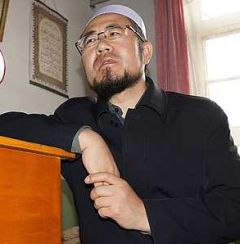| Wuzhong keeps Islam in focus | |||
|
|||
|
Wuzhong is not as famous as the other Muslim cities like Urumqi, Kashgar and Lanzhou. It is not even mentioned in the travel guide Lonely Planet. But there is more to the city – about an hour-and-a-half drive from Yinchuan in China's northwestern province of Ningxia Hui Autonomous Region – than meets the eye.
Here, Hui Muslims dominate in numbers, making up about 53 percent of its 1.5 million population. The city is a major religious hub with 1,300 mosques, more than any other city in China. Almost at every corner of the streets in the city, one would be able to chance upon a mosque with a mix of Moorish and traditional Chinese architectures. Blaring loudspeakers calling for prayers can be heard throughout the city. And there are plenty of restaurants emblazoned with the halal sign. Li Hua, a Hui Muslim, was brimming with pride when she spoke about her hometown. In Wuzhong, almost every village has a mosque. On Wuzhong Street alone, there are four mosques, namely the Dong, Beida, Nan and Zhong mosques, she said. She often visits the mosques to slaughter the chickens that she sells at her stall. "Of course, I can slaughter the chickens I rear at my home. But, I want to make sure it is slaughtered the halal way for the sake of my Muslim customers," she added. Trader Ibrahim Wang said he liked to go to the Beida Mosque for prayers as he would be joined by many other fellow Muslims. Wunan Mosque imam Wang Jinyu said the mosque was among the 10 places of worship for Muslims in Shangqiao village, which had the highest number of Muslim inhabitants in the city. "Shangqiao is a purely Muslim vicinity. Maybe there is only one Han Chinese family living in this area," he said. Wunan Mosque is among the top three mosques in Ningxia, along with Najiahu Mosque in Yongning county and Tongxin Mosque also in Wuzhong. The mosque hosts thousands of followers during Hari Raya every year. Traditionally, a Muslim community will first build a mosque when they settle in a place because the mosque is where they seek spiritual balance. "In many big cities, there are not as many mosques because the Muslims there are uncertain about their faith. Unlike Muslims in northwest China, we are more passionate about the religion," Wang said. According to Beida Mosque imam Ibrahim Ma, all the mosques in Wuzhong were funded and built by the Muslim community which received limited funds from the government for their activities. He felt that although there was a huge Muslim population, the city did not need so many mosques, especially new ones, as some of them were underused. Unlike Muslims of the Uyghur, Kazakh, Kygryz and Tajik ethnicity who have their own language, the Hui Muslims speak fluent Mandarin. Though some of them have brown eyes and speak a smattering of Arabic and Persian words, Hui Muslims are still the closest race to the Han Chinese, which is the majority race in China, in terms of physical features, character and lifestyle. A big part of the Hui Muslims today are direct descendants of Arab and Iranian merchants who had inter-marriages with the local Chinese. Another section of the Hui are of the origin of the Arab mercenaries who were enlisted by the emperor of the Tang Dynasty in 756 to fight against General An Lushan in Chang'an (now Xi'an) during the An-Shi Rebellion, Ma said. He added that only a small part of Hui Muslims were actually converts of the Han Chinese who were originally Buddhists and Taoists. Hui Muslims are estimated to make up about 10 million of China's population. The ethnic group is the fourth largest among the 55 minority races. Ma said Hui Muslims were conservative and did not have the interest in spreading Islam to other races, especially Han Chinese. "We are doing quite poorly in terms of introducing our religion to non-Muslims in China. What we need to do now is to provide Hui Muslims with higher education so that they can interact with other races better and further promote the religion. "In fact, we are more afraid that Hui Muslims who have little knowledge of their faith would gradually be converted into Han Chinese after they marry with the Han Chinese," he added. Wuzhong is the first Muslim city in China to establish resource centres at mosques to rekindle interest in the religion among young Muslims. So far, more than 200 mosques are equipped with the resource centres where the followers can read books other than those related to Islam to broaden their knowledge. |
| Tools: Save | Print | E-mail |
|
| Comment |





